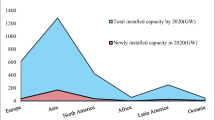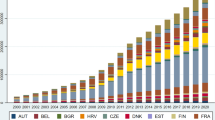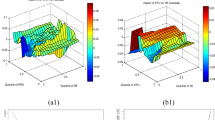Abstract
Germany, as one of the largest carbon emitters in the world, faces a crucial challenge in meeting SDG 7, which underscores the importance of affordable and clean energy. To achieve sustainability and combat climate change, it is imperative for Germany to devise innovative policies aimed at enhancing the accessibility and cleanliness of energy sources. Therefore, this study examines how climate preference, environmental policy stringency, and energy policy uncertainty affect renewable energy investments. We used a unique bootstrap rolling window causality technique to examine sectoral quarterly data from 2004 to 2021. The results from the parameter instability tests indicate that none of the estimated models exhibit constant parameters. The bootstrap rolling window causality analysis reveals that climate preference and environmental policy stringency significantly and positively impact biomass and solar energy investments, while having no influence on wind energy investments. Meanwhile, energy policy uncertainty negatively affects biomass and solar energy investments, with no impact on wind energy investments. The study provides policymakers with practical insights to help them make insightful decisions and accomplish strategic actions to encourage renewable energy investments and a sustainable future.
Graphical abstract
















Similar content being viewed by others
References
Adebayo TS, Saeed Meo M, Eweade BS, Özkan O (2024b) Examining the effects of solar energy Innovations, information and communication technology and financial globalization on environmental quality in the united States via Quantile-On-Quantile KRLS analysis. Sol Energy 272:112450. https://doi.org/10.1016/j.solener.2024.112450
Adebayo TS, Meo MS, Özkan O (2024b) Scrutinizing the impact of energy transition on GHG emissions in G7 countries via a novel green quality of energy mix index. Renew Energy, 120384.
Adedoyin F, Ozturk I, Abubakar I, Kumeka T, Folarin O, Bekun FV (2020) Structural breaks in CO2 emissions: are they caused by climate change protests or other factors? J Environ Manage 266:110628
Adedoyin FF, Erum N, Taşkin D, Chebab D (2023) Energy policy simulation in times of crisis: revisiting the impact of renewable and non-renewable energy production on environmental quality in Germany. Energy Rep 9:4749–4762
Ahmed K (2020) Environmental policy stringency, related technological change and emissions inventory in 20 OECD countries. J Environ Manage 274:111209
Alsagr N (2023) How environmental policy stringency affects renewable energy investment? Implications for green investment horizons. Utilities Policy 83:101613
Andrews DW, Ploberger W (1994) Optimal tests when a nuisance parameter is present only under the alternative. Economet J Econ Soc, pp 1383–1414.
Andrews DW (1993) Tests for parameter instability and structural change with unknown change point. Economet J Econ Soc, 821–856.
Ayad H, Abbas S, Nakhli MS, Jibir A, Shahzad U (2023) Industrial growth, health care policy uncertainty and carbon emissions: do trade and tax policy uncertainties matter for sustainable development in the USA? Struct Chang Econ Dyn 66:151–160
Balcilar M, Ozdemir ZA, Arslanturk Y (2010) Economic growth and energy consumption causal nexus viewed through a bootstrap rolling window. Energy Econ 32(6):1398–1410
Balsalobre-Lorente D, Topaloglu EE, Nur T, Evcimen C (2023) Exploring the linkage between financial development and ecological footprint in APEC countries: a novel view under corruption perception and environmental policy stringency. J Clean Prod 414:137686
Balsalobre-Lorente D, Nur T, Topaloglu EE, Evcimen C (2024) The dampening effect of geopolitical risk and economic policy uncertainty in the linkage between economic complexity and environmental degradation in the G-20. J Environ Manage 351:119679
Borozan D (2022) Asymmetric effects of policy uncertainty on renewable energy consumption in G7 countries. Renew Energy 189:412–420
Byaro M, Nkonoki J, Mafwolo G (2023) Exploring the nexus between natural resource depletion, renewable energy use, and environmental degradation in sub-Saharan Africa. Environ Sci Pollut Res 30(8):19931–19945
Cao H, Guo L, Zhang L (2020) Does oil price uncertainty affect renewable energy firms’ investment? Evidence from listed firms in China. Financ Res Lett 33:101205
Dang THN, Nguyen CP, Lee GS, Nguyen BQ, Le TT (2023) Measuring the energy-related uncertainty index. Energy Econ, 106817
Dickey DA, Fuller WA (1981) Likelihood ratio statistics for autoregressive time series with a unit root. Economet J Econ Soc, 1057–1072.
Economic Policy Uncertainty (2024) Economic Policy Uncertainty Index. Accessed from https://www.policyuncertainty.com/. Accessed on 15-04-2024.
Erum N, Musa K, Tufail S, Said J, Zakaria NB (2024) Impact of the circular economy on human development: evidence from Germany. Environment, Development, and Sustainability 1–26.
El Ouadghiri I, Guesmi K, Peillex J, Ziegler A (2021) Public attention to environmental issues and stock market returns. Ecol Econ 180:106836
Feng GF, Zheng M (2022) Economic policy uncertainty and renewable energy innovation: International evidence. Innovat Green Dev 1(2):100010
Ghosh S, Balsalobre-Lorente D, Doğan B, Paiano A, Talbi B (2022) Modelling an empirical framework of the implications of tourism and economic complexity on environmental sustainability in G7 economies. J Clean Prod 376:134281
Global Footprint Network (2023) Available at : https://data.footprintnetwork.org/#/countryTrends?cn=79&type=BCpc,EFCpc. Accessed on 10/11/2023.
Godawska J, Wyrobek J (2021) The impact of environmental policy stringency on renewable energy production in the Visegrad Group countries. Energies 14(19):6225
Granger CW (1969) Investigating causal relations by econometric models and cross-spectral methods. Economet J Econ Soc, 424–438.
Hansen BE (1992) Testing for parameter instability in linear models. J Policy Model 14(4):517–533
Herman KS, Xiang J (2019) Induced innovation in clean energy technologies from foreign environmental policy stringency? Technol Forecast Soc Chang 147:198–207
Ivanovski K, Marinucci N (2021) Policy uncertainty and renewable energy: exploring the implications for global energy transitions, energy security, and environmental risk management. Energy Res Soc Sci 82:102415
Ji J, Zhang Z, Yang L (2017) Carbon emission reduction decisions in the retail-/dual-channel supply chain with consumers’ preference. J Clean Prod 141:852–867
Khan K, Su CW (2022) Does policy uncertainty threaten renewable energy? Evidence from G7 countries. Environ Sci Pollut Res 29(23):34813–34829
Khurshid A, Khan K, Chen Y, Cifuentes-Faura J (2023) Do green transport and mitigation technologies drive OECD countries to sustainable path? Transp Res Part d: Transp Environ 118:103669
Khurshid A, Qayyum S, Calin AC, Saleem SF, Nazir N (2022) The role of pricing strategies, clean technologies, and ecological regulation on the objectives of the UN 2030 Agenda. Environ Sci Pollut Res, pp 1–14.
Li P, Abbas J, Balsalobre-Lorente D, Wang Q, Zhang Q, Shah SAR (2024) Impact of sectoral mix on environmental sustainability: How is heterogeneity addressed? Gondwana Res 128:86–105
Liu R, He L, Liang X, Yang X, Xia Y (2020) Is there any difference in the impact of economic policy uncertainty on the investment of traditional and renewable energy enterprises?–a comparative study based on regulatory effects. J Clean Prod 255:120102
Meo MS, Abd Karim MZ (2022) The role of green finance in reducing CO2 emissions: an empirical analysis. Borsa Istanbul Rev 22(1):169–178
Meo MS, Chowdhury MAF, Shaikh GM, Ali M, Masood Sheikh S (2018) Asymmetric impact of oil prices, exchange rate, and inflation on tourism demand in Pakistan: new evidence from nonlinear ARDL. Asia Pacific J Tour Res 23(4):408–422
Murshed M, Saboori B, Madaleno M, Wang H, Doğan B (2022) Exploring the nexuses between nuclear energy, renewable energy, and carbon dioxide emissions: the role of economic complexity in the G7 countries. Renew Energy 190:664–674
Nyblom J (1989) Testing for the constancy of parameters over time. J Am Stat Assoc 84(405):223–230
OECD (2024) Organization of Economic Cooperation and Development. Accessed from https://www.oecd.org/. Accessed on 15-04-2024.
Palmer K, Oates WE, Portney PR (1995) Tightening environmental standards: the benefit-cost or the no-cost paradigm? J Econ Perspect 9(4):119–132
Phillips PCB, Perron P (1988) Testing for a unit root in time series regression. Biometrika 75(2):335–346. https://doi.org/10.1093/biomet/75.2.335
Porter M (1991) America’s green strategy. Sci Am 264(4):168
Porter ME, Linde CVD (1995) Toward a new conception of the environment-competitiveness relationship. J Econ Perspect 9(4):97–118
Ren Q, Pei J (2023) Do green financial and non-financial policies achieve the carbon neutrality target? Environ Sci Pollut Res 30(43):97965–97976
Shafiullah M, Miah MD, Alam MS, Atif M (2021) Does economic policy uncertainty affect renewable energy consumption? Renew Energy 179:1500–1521
Shang Y, Han D, Gozgor G, Mahalik MK, Sahoo BK (2022) The impact of climate policy uncertainty on renewable and non-renewable energy demand in the United States. Renew Energy 197:654–667
Sharif A, Meo MS, Chowdhury MAF, Sohag K (2021) Role of solar energy in reducing ecological footprints: an empirical analysis. J Clean Prod 292:126028
Shukur G, Mantalos P (2000) A simple investigation of the Granger-causality test in integrated-cointegrated VAR systems. J Appl Stat 27(8):1021–1031
Sohail MT, Xiuyuan Y, Usman A, Majeed MT, Ullah S (2021) Renewable energy and non-renewable energy consumption: assessing the asymmetric role of monetary policy uncertainty in energy consumption. Environ Sci Pollut Res 28:31575–31584
Usman M, Jahanger A, Makhdum MSA, Balsalobre-Lorente D, Bashir A (2022) How do financial development, energy consumption, natural resources, and globalization affect Arctic countries’ economic growth and environmental quality? An Adv Panel Data Simulation Energy 241:122515
Wolde-Rufael Y, Weldemeskel EM (2020) Environmental policy stringency, renewable energy consumption and CO2 emissions: Panel cointegration analysis for BRIICTS countries. Int J Green Energy 17(10):568–582.
Wang Z, Yen-Ku K, Li Z, An NB, Abdul-Samad Z (2022) The transition of renewable energy and ecological sustainability through environmental policy stringency: Estimations from advance panel estimators. Renew Energy 188:70–80
Zhao C, Wang J, Dong K, Wang K (2023) How does renewable energy encourage carbon unlocking? A global case for decarbonization. Resour Policy 83: 103622.
Author information
Authors and Affiliations
Contributions
MSM has performed empirical analysis and wrote conclusion and policy implications. NE worked on methodology and interpretation of results. HA worked on introduction and literature review.
Corresponding author
Ethics declarations
Conflict of interests
The authors declare no competing interests.
Additional information
Publisher's Note
Springer Nature remains neutral with regard to jurisdictional claims in published maps and institutional affiliations.
Rights and permissions
Springer Nature or its licensor (e.g. a society or other partner) holds exclusive rights to this article under a publishing agreement with the author(s) or other rightsholder(s); author self-archiving of the accepted manuscript version of this article is solely governed by the terms of such publishing agreement and applicable law.
About this article
Cite this article
Meo, M.S., Erum, N. & Ayad, H. Understanding how climate preferences, environmental policy stringency, and energy policy uncertainty shape renewable energy investments in Germany. Clean Techn Environ Policy (2024). https://doi.org/10.1007/s10098-024-02876-1
Received:
Accepted:
Published:
DOI: https://doi.org/10.1007/s10098-024-02876-1




